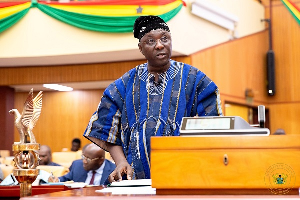As of June 2024, the Ghana Revenue Authority had collected GH¢56.4billion through the Ghana Integrated Financial Management Information System (GIFMIS) platform.
This represents a 34.6 percent increment compared to payments received through the platform the same period last year.
The Finance Minister, Dr. Mohammed Amin Adam, disclosed this in his presentation of the Mid-Year Budget Review 2024 on the floor of Parliament in Accra.
“In line with commitment to ensuring full disclosure of retained internal generated funds by public institutions, government has deployed theGhana.Gov platform to over 1,500 public institutions and also rolled out the Ghana Integrated Financial Management Information System (GIFMIS) to 287 IGF-reliant public institutions.
“As at the end of June, 140 public institutions, including GRA, had gone live and received payments through the platform, totalling GH¢56.4billion, an increase of 34.6 percent compared to the same period last year,” he said.
The development, Dr. Adam noted, is in line with domestic revenue mobilisation and expenditure control measures set by government.
In the 2024 Budget Statement and Economic Policy, government outlined a series of revenue measures consistent with the Medium-Term Revenue Strategy (MTRS). These measures, the minister noted, were a reflection of the commitment of government to improve the tax-to-GDP ratio from the current 14.1 percent to 18 – 20 percent by 2027.
“In the 2024 budget, government amended existing legislation to give effect to the revenue measures. These measures also aim to broaden the tax base and improve tax compliance for a more equitable and efficient revenue system.
“Mr. Speaker, while not all the measures were implemented in the first half of the year, through enhanced compliance and enforcement, the Ghana Revenue Authority (GRA) exceeded its mid-year target by 0.2 percent. Similarly, Non-Tax Revenue (NTR) performance as at the end of June exceeded the target by 14.0 percent,” the minister further explained.
Outlook
For the rest of the year (between July and December 2024), Dr. Adam said the Ministry of Finance will deepen engagements with both GRA and relevant stakeholders to effectively implement policy, administrative and regulatory measures to ensure that the revenue targets set by government are met.
To broaden the tax base, he noted a simplified digital solution for the operationalisation of the modified taxation scheme will be deployed, as well as an electronic bookkeeping system.
Additionally, he projected that 2000 more taxpayers will be on-boarded onto the electronic invoicing system (e-VAT) by the close of the year.
“GRA will also continue with the cleaning of the taxpayer register and on-board more taxpayers onto its electronic systems to improve the taxpayer experience and compliance. In addition, GRA will continue to enhance data sharing with other tax jurisdictions to boost revenue mobilisation.
“The ministry will continue the deployment of the Ghana.Gov payment platform to remaining public institutions and ensure that all those already on-boarded go live. Additionally, the outstanding activities for the full roll-out and utilisation of the GIFMIS for the processing of IGF expenditures will be completed by the end of the year,” he added.
The Finance Minister also touted certain decisions that government has embarked on in the last two years to get the country’s economy back on track toward fiscal consolidation, economic stability and growth, stressing that the said policies have been implemented and are yielding the expected results.
To advance the digitalisation drive and expand a unique identification system in the country, he said government invested about GH¢135million in the national identification programme since January 2024.
“This significant progress has been underpinned by an environment of enhanced and inclusive engagements with key stakeholders. These engagements have provided useful feedback, improved understanding and bolstered cooperation.
“We are determined to stay the course on our fiscal consolidation programme. Increased attention will continue to be given to prudent management of approved expenditures and improved revenue mobilisation,” he added.
Business News of Friday, 26 July 2024
Source: thebftonline.com













